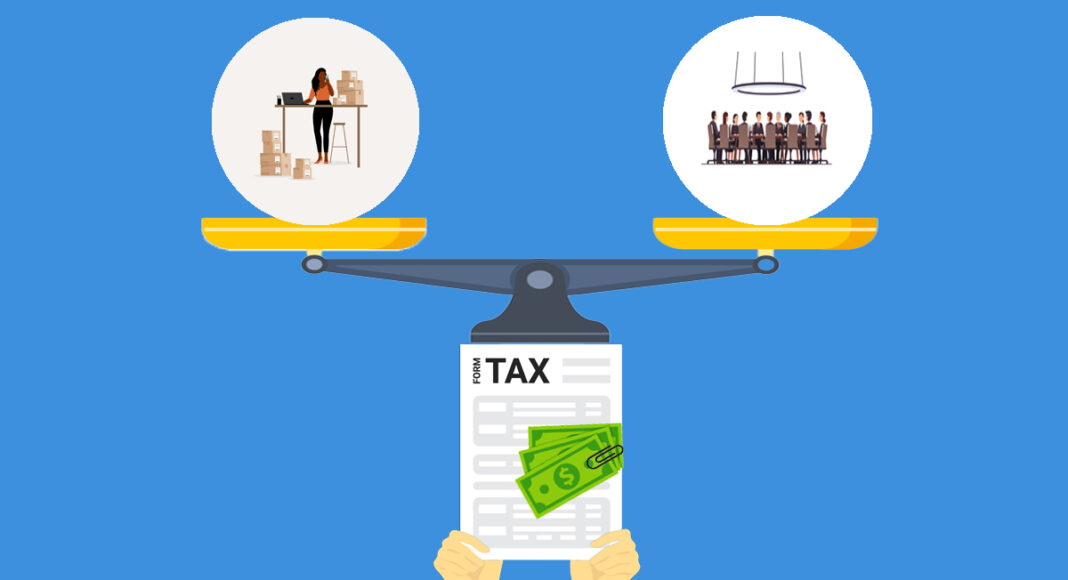Corporate America makes sport of gaming the tax authorities, especially after decades of budget cuts to the IRS. What dominant corporations make by hiring expensive tax and lobby teams to distort the rules in their favor, smaller businesses, workers, and the general public are forced to cover with higher taxes and worsened services. Competition shouldn’t hinge on who has more pull over the tax rules and how they’re enforced. Decisions made over the next year to modernize the IRS present a historic opportunity to shape a less entrenched and more competitive economy, writes Niko Lusiani.
At its core, the Internal Revenue Service has a dual mandate. The first is to serve working people and smaller businesses by administering significant financial benefits. The second is to robustly defend the public interest as an enforcement authority overseeing the wealthy and large dominant corporations with the most incentive to avoid paying their fair share.
Decades of Congressional disinvestment and political demonization have weakened and even upended this core mission. Understaffing led to fewer taxpayer services and prioritizing less complex audits, which led to an unacceptably high auditing burden placed on low-income households, Black taxpayers, and small businesses. Fewer resources and fewer people also stripped away the labor-intensive auditing needed to properly deal with ever-more-complex tax filings like those of large corporations.
Our tax system, based on voluntary reporting, relies on trust. Auditing efforts are a backstop to keeping taxpayers honest. Trust, but verify. As a result of these chronic underinvestments in audits of higher-income taxpayers, America’s “tax gap” (the difference between what is owned and what is paid) now stands at over $600 billion per year (a stunning 3% of GDP). The lion’s share of that loss stems from the same underreporting and under-audited group of wealthy households, partnerships, and large corporations which have benefited most from IRS budget cuts.
What is lost revenue for public investments is also gained income for those individual and large corporate tax filers which benefit. Considering that a typical U.S. business pays around 20-30% of its revenue in tax, any tax savings from differential tax enforcement can go a long way in giving a firm a leg up against the competition. That’s why many of the largest American corporations have spent the past few decades trying to remake the IRS into one of its own profit centers by lobbying to rewrite the tax rules. They have also hired expensive tax teams to game the tax authorities through obtuse and extremely complex offshore business structures which are simply unavailable for small businesses, let alone budding entrants. In this sense, competition today hinges in sizeable part on which firms have more pull over the tax rules and how they’re enforced.
The individual actions of many dominant companies acting in concert to avoid tax has had systemic consequences on the competitive playing field. According to the Small Business Administration, small businesses in 2009 paid on average 20% in federal income tax. Fueled by the 2017 Tax Cuts and Jobs Act, large profitable companies paid only 9% in effective tax in 2018, according to the U.S. Government Accountability Office. New Roosevelt Institute research, to be released in the fall, finds that today the top 10% of U.S. corporations pay significantly less in tax as a percentage of their revenue than the bottom 90%, which pays much more. That’s in contrast to the 1970s, when the effective tax rate paid by smaller firms was on par with what large corporations paid. Unequal federal tax treatment stemming from IRS budget cuts is likely a contributing factor, resulting in a tangible unfair method of competition and yet another leg up for big business against competitors and entrants. IRS underfunding has resulted in yet another example of how changes to tax policy over the past 40 years have deepened market concentration.
But new changes are at play. The Inflation Reduction Act—while mostly known for its clean energy investments—provided $80 billion for modernizing the IRS. (About a fourth of which was rescinded as a result of the June debt ceiling deal.) The express aim of this new funding is to enhance taxpayer services while enhancing auditing and, when needed, cracking down on non-compliance by complex partnership structures, large corporations, and wealthy individuals. What’s more, these new enforcement resources will not be used to increase the audit rate for small businesses and lower- and middle-income households.
By heightening oversight of the more complex filings of large corporations, while at the same time enhancing services for more small and medium firms (like free direct filing), these historic investments in the IRS can help balance out the skewed tax burden between small and big business. The upscaling and upskilling of the tax authorities is estimated to raise $180 billion over the next decade. If the IRS is successful at ensuring that this money is raised from those corporations and wealthy individuals most able to pay—while providing better services for small businesses and working people who want to start one—this could present a real opportunity to shift power away from dominant corporations and their owners and toward a more vibrant and multi-player market structure. Vigorous tax enforcement at the top, paired with enhanced services at the bottom, can help enable a more dynamic, innovative, and truly competitive economy. Proponents of market competition would be well-served by supporting IRS modernization.
Disclosure: The author works for the Roosevelt Institute, which receives funding from organizations like the Ford Foundation, William and Flora Hewlett Foundation, Omidyar Network, and Open Society Foundations. Read more about our disclosure policy here.
Articles represent the opinions of their writers, not necessarily those of the University of Chicago, the Booth School of Business, or its faculty.






